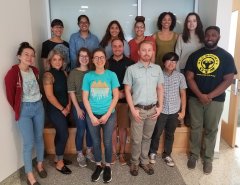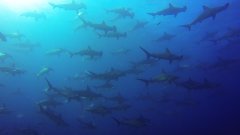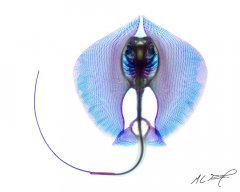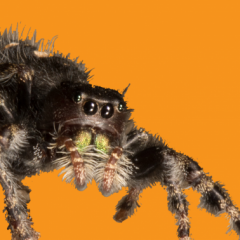News Highlights
Announcing the Inauguration of the On-Ramp Summer Pre-graduate Program
Announcing the Inauguration of the On-Ramp Summer Pre-graduate Program
The Interdepartmental Graduate Programs in the Life Sciences (IDGPs) launched a brand-new On-Ramp program for entering students on August 1st, with 18 soon-to-be PhD students participating. The month-long On-Ramp program is designed to facilitate the transition to graduate school by providing mentoring and professional development opportunities prior to the start of fall classes. Participants have the opportunity to work closely with a faculty member and current graduate students in a laboratory or in the field on research. In addition to hands-on training experience, On-Ramp students participate in lab meetings, journal clubs, and professional development workshops. On-Ramp students are paired with a graduate student peer mentor and join current students for social and programmatic events. There has been enthusiastic support for On-Ramp from all four IDGP graduate programs (MCB, NSB, OEB, and PB). We hope the On-Ramp Summer Research Program becomes a permanent part of the IDGP graduate experience at UMass.
Molecular and Cellular Biology Program
Neuroscience and Behavior Program
Organismic and Evolutionary Biology Program
Plant Biology Program
Three OEB Students Awarded NSF Graduate Research Fellowships
Three OEB Students Awarded NSF Graduate Research Fellowships
Congratulations to Eve Beaury, Alison Fowler, and Rachel Bell, who were among nine UMass students to win the 2019 competition for NSF Graduate Research Fellowships. Barbara Krauthamer, dean of the Graduate School, says these are some of the most prestigious and competitive awards available to students. (Read more...)
Marine Protected Reserves Do More Than Restore Fish
News on the need to protect and restore biodiversity in our oceans
Marine Protected Reserves Do More Than Restore Fish
News on the need to protect and restore biodiversity in our oceans
Analyzing field experiments from across the globe, Brian Cheng and collaborators at the Smithsonian Institution and the University of Florida say their findings reveal that marine reserves increase predation rates by protecting predators that were once heavily fished by humans, allowing their numbers to thrive. Their study appears online in the current issue of Ecology, the flagship journal of the Ecological Society of America. Read More
Mariamar Gutierrez Ramirez wins Ford Foundation Fellowship
4 OEB students awarded grants from the Natural History Collections
Mariamar Gutierrez Ramirez wins Ford Foundation Fellowship
4 OEB students awarded grants from the Natural History Collections
Congratulations to Mariamar Gutierrez Ramirez on being awarded the highly competitive and prestigious Ford Foundation Fellowship. Woohoo! Way to go, Mariamar! In addition, 4 students were awarded grants this year from the Natural History Collections: Rachel Bell, Kadambari Devarajan, Chaise Gilbert, and Carolina Muñoz-Agudelo. We are excited to celebrate all these successes - be sure to share yours with us!
Image Created by Chaise Gilbert to be Featured in Prestigious "Images from Science 3" Exhibition
Image Created by Chaise Gilbert to be Featured in Prestigious "Images from Science 3" Exhibition
The work of OEB student Chaise GIlbert will be showcased as part of Images From Science 3, an exhibition organized to showcase the world's best and most compelling images originally made to document, reveal or discover aspects of research, treatment, or scientific discovery. At its core mission, the project seeks to explore the interface of science, technology, art, design, and communication. Science images, unlike most other genres of images, rarely find their way into art museums. This prestigious exhibition is comprised of entries from all around the world and judged by an international panel of doctors, scientists, and imaging experts. Chaise's work will be showcased as part of this exhibition at the RIT’s City Space in downtown Rochester NY. It will then travel to Johns Hopkins University in Baltimore MD, and from there it will go on international tour. Later this year, RIT Press will reproduce the exhibition in print. (Read more)
Sleep Secret:
Neuroscientist probes sleep’s role in learning and memory
Sleep Secret:
Neuroscientist probes sleep’s role in learning and memory
Does “sleeping on it” help us make better decisions? Are sleep disorders just a natural part of aging? How important are naps, anyhow? Rebecca Spencer, Professor in the Department of Psychological and Brain Sciences and director of the UMass Amherst Sleep Monitoring Lab is finding answers to these questions. Read More
UMass Amherst researchers studied origins of adverse effects of a common anti-cancer treatment
UMass Amherst researchers studied origins of adverse effects of a common anti-cancer treatment
Results of a new study by neuroscientists at the University of Massachusetts Amherst suggest that a new treatment approach is needed – and how this may be possible – to address adverse effects of aromatase inhibitors, drugs commonly prescribed to both men and women to prevent recurrence of estrogen-positive breast cancer.
Neuroscientists Agnès Lacreuse, Luke Remage-Healey and their graduate students at UMass Amherst, collaborator Jessica Mong at the University of Maryland and first author Nicole Gervais worked together on this research. Gervais, who conducted the experiments as a postdoctoral researcher at UMass Amherst, is now at the University of Toronto. The authors studied a small group of aged male and female marmosets, non-human primates whose brains are much like humans’ and which exhibit “complex behavior,” senior author Lacreuse explains. (Read more)
Ragweed may follow climate change northward
Ragweed may follow climate change northward
A new predictive model suggests that climate change may allow common ragweed to extend its growing range northward and into major northeast metro areas, worsening conditions for millions of people with hay fever and asthma.
Plant ecologist Kristina Stinson, Environmental Conservation, who leads a research team that has been studying this plant for over a decade – particularly how it responds to elevated CO2 levels – worked with climate modeler and corresponding author Michael Case at University of Washington on this project. Details appear online in the journal PLOS One, and were also featured in The Daily Hampshire Gazette, as well as University of Washington News. Read more
Eyes on the prize: What jumping spiders do with eight eyes
Eyes on the prize: What jumping spiders do with eight eyes
Using a specially designed eye-tracker for use with spiders, biologists Elizabeth Jakob, OEB Alumna Skye Long and Adam Porter at UMass, along with colleagues in New York and New Zealand, report in a new paper that their tests in jumping spiders show a secondary set of eyes is crucial to the principal eyes’ ability to track moving stimuli. Read more
Four new assistant professors join the Neuroscience and Behavior Graduate Program
Four new assistant professors join the Neuroscience and Behavior Graduate Program
The Neuroscience and Behavior Graduate Program welcomes four new Assistant Professors. They epitomize the diversity of backgrounds and approaches in the Neurosciences. Two of the faculty members are in Biology, one in Psychological Brain Sciences, and one in Communication Disorders. Each of them is recruiting PhD students for the coming year. Read More.








